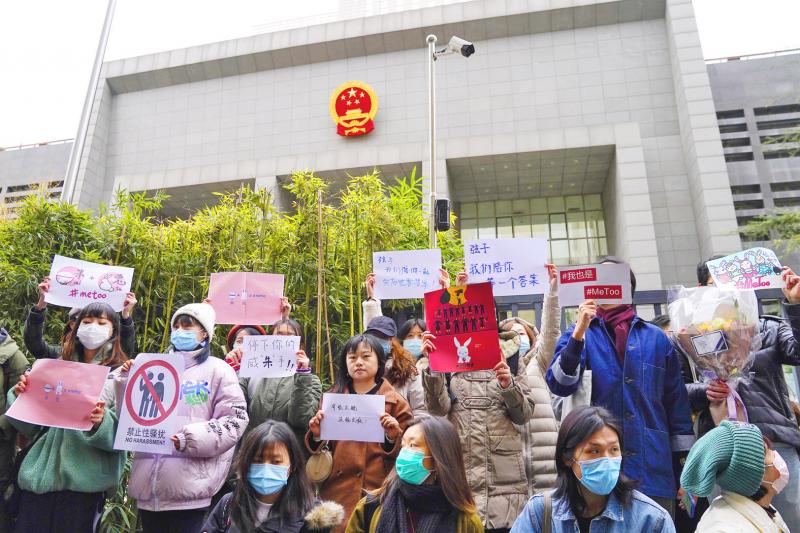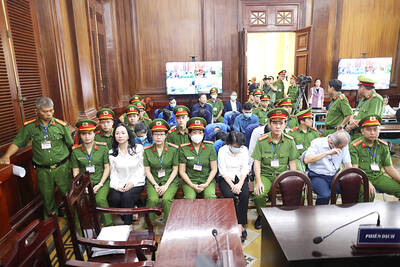A sexual harassment case against a powerful Chinese media figure yesterday began in Beijing, with his accuser calling it a major moment in the country’s still-young #MeToo movement.
Zhou Xiaoxuan, 27, known in China by the nickname Xianzi (弦子), sparked a social media storm in 2018 after accusing prominent television host Zhu Jun (朱軍) of groping and forcibly kissing her when she was an intern at state broadcaster China Central Television (CCTV).
China’s first-ever civil code — passed in May — expanded the definition of sexual harassment, but many women are still reluctant to come forward and it is rare for cases like this to make it to court.

Photo: AP
“I’m very nervous,” she told reporters ahead of the hearing. “But whether we win or lose the case, it has meaning.”
“If we lose, it allows the questions we raised at least to remain in history. Someone will have to give us an answer,” she added.
Zhou said she found herself alone in a dressing room with Zhu in 2014, and that he groped her after asking if she wanted to continue to work for the channel after her internship.
Zhu is a former host of the country’s annual Spring Festival Gala — one of the world’s most-watched television shows — and other major broadcast events.
He has denied the allegations and launched his own court case accusing her of damaging his reputation.
There were about 100 Zhou supporters outside the court yesterday, some holding banners reading “#MeToo” and “We oppose sexual harassment.”
One supporter, Lucy Lu, told reporters: “No matter what happens, we think she is very brave.”
Zhou broke down in tears as she addressed her supporters ahead of the trial, telling them: “We may be joyous or we may run into setbacks. But please don’t take my setbacks to heart... We have to believe that even if history repeats itself, things will definitely progress.”
There were violent scuffles outside the courtroom as supporters protested when police moved in, told the crowd to put down their banners, and dragged away and detained foreign reporters, including Agence France-Presse.
Zhou’s case against Zhu was originally filed under the “personality rights” law — covering rights relating to an individual’s health and body — but her lawyers have asked for it to be considered under the new legislation.
She was among a wave of people who came forward in 2018 when an emerging #MeToo movement rocked China.
When she initially reported the case to police, she said she was told that speaking out would affect the image of CCTV and hurt the feelings of those who admired Zhu.
“These [experiences] make you feel like your existence is very insignificant,” she told reporters. “Actual harm inflicted on your body can’t even compare with the other party’s illusory fame and power.”
Many women are reluctant to speak out in China’s conservative society where victims can also face blame.
However, Zhou has no regrets about launching the case and said that even if it is unsuccessful, she hopes it will encourage more women to speak up.
“Even if I had to experience this all over again, I don’t regret it. In this process I developed an emotional connection with many women and men who had similar experiences,” she said. “I think all of this is still meaningful.”
Although China’s #MeToo movement was restrained by online censorship and tightening state control over civil society, several well-known individuals came under fire over allegations of sexual misconduct, including the former head of the government-run Buddhist association.
Lawyer Lu Xiaoquan told reporters that although disputes over sexual harassment can now be taken to court, “having these laws cannot fundamentally change the difficulties sexual harassment victims face.”

Republican US lawmakers on Friday criticized US President Joe Biden’s administration after sanctioned Chinese telecoms equipment giant Huawei unveiled a laptop this week powered by an Intel artificial intelligence (AI) chip. The US placed Huawei on a trade restriction list in 2019 for contravening Iran sanctions, part of a broader effort to hobble Beijing’s technological advances. Placement on the list means the company’s suppliers have to seek a special, difficult-to-obtain license before shipping to it. One such license, issued by then-US president Donald Trump’s administration, has allowed Intel to ship central processors to Huawei for use in laptops since 2020. China hardliners

A top Vietnamese property tycoon was on Thursday sentenced to death in one of the biggest corruption cases in history, with an estimated US$27 billion in damages. A panel of three hand-picked jurors and two judges rejected all defense arguments by Truong My Lan, chair of major developer Van Thinh Phat, who was found guilty of swindling cash from Saigon Commercial Bank (SCB) over a decade. “The defendant’s actions ... eroded people’s trust in the leadership of the [Communist] Party and state,” read the verdict at the trial in Ho Chi Minh City. After the five-week trial, 85 others were also sentenced on

Conjoined twins Lori and George Schappell, who pursued separate careers, interests and relationships during lives that defied medical expectations, died this month in Pennsylvania, funeral home officials said. They were 62. The twins, listed by Guinness World Records as the oldest living conjoined twins, died on April 7 at the Hospital of the University of Pennsylvania, obituaries posted by Leibensperger Funeral Homes of Hamburg said. The cause of death was not detailed. “When we were born, the doctors didn’t think we’d make 30, but we proved them wrong,” Lori said in an interview when they turned 50, the Philadelphia Inquirer reported. The

RAMPAGE: A Palestinian man was left dead after dozens of Israeli settlers searching for a missing 14-year-old boy stormed a village in the Israeli-occupied West Bank US President Joe Biden on Friday said he expected Iran to attack Israel “sooner, rather than later” and warned Tehran not to proceed. Asked by reporters about his message to Iran, Biden simply said: “Don’t,” underscoring Washington’s commitment to defend Israel. “We are devoted to the defense of Israel. We will support Israel. We will help defend Israel and Iran will not succeed,” he said. Biden said he would not divulge secure information, but said his expectation was that an attack could come “sooner, rather than later.” Israel braced on Friday for an attack by Iran or its proxies as warnings grew of